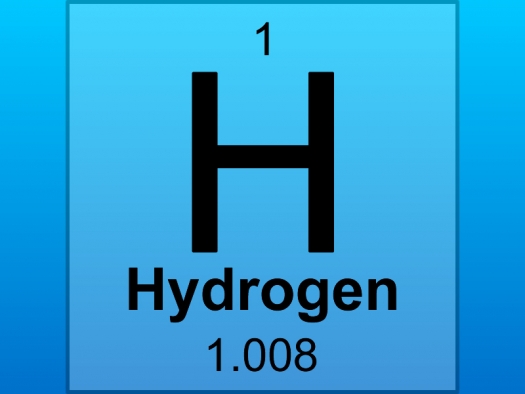HydrogenElementPeriodicTable.jpg

Illustration by FAIM
Hydrogen gas (H2) has been extolled for its use in “green energy” as an alternative fuel, but biomedical research over the past decade suggests it also has therapeutic biological benefits. For example, the preliminary 1,000+ animal and clinical studies have reported hydrogen to have antioxidant, anti-inflammatory, anti-allergy, anti-obesity, and anti-aging effects.1, 2 This is rather surprising from a biochemistry perspective since hydrogen gas, a natural byproduct of fermentation by the intestinal microbiota, has long been considered to be “biologically inert.”3
What exactly is molecular hydrogen?
Molecular hydrogen is simply two hydrogen atoms bonded together to form hydrogen gas. It has the chemical structure of H-H with a simple chemical formula of “H2.” Although in nature, hydrogen atoms are often found bonded to other atoms, such as oxygen, to form water (H2O), or to carbon to form methane (CH4), for therapeutic benefit, we specifically need the H2 molecule (H2 gas). Additionally, to avoid any confusion, it is also important that we distinguish between pH and H2; they are completely different. The term pH has reference to the concentration of positively charged hydrogen ions (H+) in solution, which is totally different from H2 gas. Indeed molecular hydrogen has no influence on pH, and has no reference to alkaline water. Furthermore, when H2 gas is dissolved in water, it does not alter water chemistry/properties (e.g. does not form H4O), but is simply H2 gas that is dissolved into water.
How do we administer molecular hydrogen?
In the clinical studies, we normally administer molecular hydrogen via inhalation, drinking water that contains the dissolved H2 gas (i.e. hydrogen water), bathing in hydrogen water, intravenous administration of hydrogen saline, and even hyperbaric hydrogen chambers.4
What are some of the key benefits to molecular hydrogen?
Hydrogen has now been demonstrated to have therapeutic effects in over 170 different human and animal disease models, and in essentially every organ of the human body.5 The main reason for this is because H2 helps attenuate excessive oxidative stress and inflammation, both of which are at the root of virtually every disease and pathology.1, 2
How does hydrogen gas provide antioxidant, anti-inflammatory, and anti-aging effects?
Molecular hydrogen was first reported in Nature Medicine to protect the brain during ischemia/reperfusion injury, and to selectively reduce cytotoxic oxygen radicals.6 Many animal and clinical studies have subsequently demonstrated that hydrogen gas administered via inhalation or drinking hydrogen water can attenuate markers of oxidative stress and improve antioxidant status. For example, in a small open label study of 20 patients with potential metabolic syndrome, subjects ingested 1.5-2 L of hydrogen water (≈0.6 mM) per day for 8 weeks.7 On average, besides improving cholesterol and glucose tolerance, the patients had a 43% decrease in the oxidative marker TBARS (thiobarbituric acid reactive substances) in the urine, and a 39% increase in the antioxidant enzyme superoxide dismutase.7 Similar benefits were also demonstrated in 16 healthy subjects in a randomized, double-blinded placebo controlled study.8 Drinking hydrogen water for 4 weeks decreased the oxidative marker malondialdehyde (MDA) by ≈26 %, p<0.001, increased superoxide dismutase, and the master antioxidant glutathione levels by 25.9% (p=0.003), and 10.1% (p=0.007), respectively.8
Besides demonstrating similar antioxidant effects, other animal and clinical studies also report decreased inflammation.9 For example, H2 can decrease and modify pro-inflammatory mediators/transcription factors (e.g. cytokines, C-reactive protein, TNF-a, NF-κB, NFAT, etc.).1, 2, 5, 9, 10, 11
The exact mechanism(s) by which H2 attenuates oxidative stress are still under investigation. However, it has been demonstrated using miRNA interference, gene knockout studies, etc., that hydrogen can activate the Nrf2 pathway,5, 12 which regulates the transcription of over 200 cytoprotective genes.13 The activation of the Nrf2 pathway regulates phase ii enzymes involving detoxification (e.g., ABCG2, MRP3, MRP4, GST), antioxidation (e.g., NQO1, NQO2, HO-1), antiapoptotic (e.g., Bcl-2), and metabolic (e.g., G6PD, TKT, PPARγ) pathways.14 This may help explain why H2 can also exerts anti-diabetic and anti-obesity effects.15, 16
Autophagy benefits
Animal and cell studies similarly demonstrate hydrogen's beneficial effect on signal transduction and gene expression.5 The benefits of autophagy and mitophagy (self-cannibalizing mechanisms to remove damaged/dysfunctional cells and mitochondria) have also been investigated. Hydrogen therapy in rodents activated autophagy pathways, increased autophagosomes, autolysosomes,17, 18 and mitophagy mediated by the PINK1/Parkin signaling pathway.19 However, too much autophagy can also be pathological, which was the case in a study of myocardial ischemic/reperfusion injury in rats.20 However, hydrogen was able to exert protective effects in this disease model by attenuating the endoplasmic reticulum stress and down-regulating the excessive autophagy.20
Neurological and other health benefits
Some exciting neurological research on hydrogen is also showing promise. The Japanese government has approved H2 inhalation as an advanced medicine for the treatment of postcardiac arrest syndrome, which will also have neurological benefits.21 A small randomized controlled clinical study of 50 patients with cerebral infarction22 compared inhalation of hydrogen to the approved medical drug, edaravone. According to the MRI, and NIHSS scores for clinically quantifying stroke severity, these preliminary results suggest that hydrogen therapy was more effective than the approved medical drug.22 Simply drinking hydrogen water also appears to have good effects in ≈1-year randomized-placebo controlled trials of Parkinson’s,23 and mild cognitive impairments (n= 73) (particularly those of APOE4 genotype).24 A small double-blinded, placebo-controlled, cross over study also reported neurological benefits in healthy subjects. Drinking hydrogen water (600 mL/day) for 4 weeks resulted in decreased sympathetic nerve activation at rest, and improved mood and anxiety.25 This correlated well to an early animal study we performed where hydrogen therapy was effective at increasing resilience to acute and chronic stress by regulating the hypothalamic-pituitary-adrenal axis and the inflammatory responses to stress.26 We subsequently provided evidence in a study published in Frontier’s Journal of Behavioral Neuroscience, that oral ingestion of hydrogen water can reverse the autistic-like behaviors (e.g. impaired social behavior, memory impairment, inflammation TNF-α and IL-6, etc.) induced by maternal exposure to the toxin VPA in mice.27
However, the research on hydrogen is still in its infancy, and H2 therapy is not a panacea for every condition. For example, although many studies have found that hydrogen is beneficial to the brain in models of ischemia reperfusion,28-31 one study found that H2 inhalation was ineffective in a moderate to severe model of neonatal ischemia-reperfusion injury in rats.32 Nevertheless, the preliminary data from animal and clinical studies continue to suggest that hydrogen may have significant implications in current medicine because it is safe, easy to administer, and has immediate clinical applications.1, 2
How can doctors and patients access molecular hydrogen?
There are a growing number of hydrogen products that are widely available on the market. Some products include hydrogen inhalation devices, ready-to-drink hydrogen beverages, hydrogen-producing machines, hydrogen-producing tablets, etc. The science-based Molecular Hydrogen Institute does not sell, recommend, or endorse hydrogen products or companies, but we do encourage consumers to verify that the products actually contain/produce hydrogen gas and have consistent performance, as many products do not reach the levels we use in research, or fulfill the claims made by the companies selling them.
For more information watch the video below and/or visit the Molecular Hydrogen Institute website.
Molecular Hydrogen Institute Founder Tyler LeBaron
Molecular Hydrogen Institute
References
- Zhang, Y., et al., Hydrogen Therapy in Cardiovascular and Metabolic Diseases: from Bench to Bedside. Cell Physiol Biochem, 2018. 47(1): p. 1-10.
- Sano, M., et al., Promising novel therapy with hydrogen gas for emergency and critical care medicine. Acute Med Surg, 2018. 5(2): p. 113-118.
- Li, H.M., et al., The transfer of hydrogen from inert gas to therapeutic gas. Med Gas Res, 2017. 7(4): p. 265-272.
- Ohta, S., Molecular hydrogen as a preventive and therapeutic medical gas: initiation, development and potential of hydrogen medicine. Pharmacol Ther, 2014.
- Ichihara, M., et al., Beneficial biological effects and the underlying mechanisms of molecular hydrogen - comprehensive review of 321 original articles. Med Gas Res, 2015. 5: p. 12.
- Ohsawa, I., et al., Hydrogen acts as a therapeutic antioxidant by selectively reducing cytotoxic oxygen radicals. Nat Med, 2007. 13(6): p. 688-694.
- Nakao, A., et al., Effectiveness of Hydrogen Rich Water on Antioxidant Status of Subjects with Potential Metabolic Syndrome-An Open Label Pilot Study. Journal of Clinical Biochemistry and Nutrition, 2010. 46(2): p. 140-149.
- Trivic, T., et al., Drinking hydrogen-rich water for 4 weeks positively affects serum antioxidant enzymes in healthy men: a pilot study. Current Topics in Nutraceutical Research, 2017. 15(1): p. 45-48.
- Ishibashi, T., et al., Consumption of water containing a high concentration of molecular hydrogen reduces oxidative stress and disease activity in patients with rheumatoid arthritis: an open-label pilot study. Medical Gas Research, 2012. 2(1): p. 27.
- Nicolson, G.L., et al., Clinical Effects of Hydrogen Administration: From Animal and Human Diseases to Exercise Medicine. International Journal of Clinical Medicine, 2016. 7(1).
- Ohta, S., Molecular hydrogen as a novel antioxidant: overview of the advantages of hydrogen for medical applications. Methods Enzymol, 2015. 555: p. 289-317.
- Yuan, J., et al., Hydrogen-rich water attenuates oxidative stress in rats with traumatic brain injury via Nrf2 pathway. J Surg Res, 2018. 228: p. 238-246.
- Swamy, S.M., N.S. Rajasekaran, and V.J. Thannickal, Nuclear Factor-Erythroid-2-Related Factor 2 in Aging and Lung Fibrosis. Am J Pathol, 2016. 186(7): p. 1712-23.
- Shelton, P. and A.K. Jaiswal, The transcription factor NF-E2-related factor 2 (Nrf2): a protooncogene? FASEB J, 2013. 27(2): p. 414-23.
- Korovljev, D., et al., Molecular hydrogen affects body composition, metabolic profiles, and mitochondrial function in middle-aged overweight women. Ir J Med Sci, 2017.
- Kamimura, N., et al., Molecular Hydrogen Improves Obesity and Diabetes by Inducing Hepatic FGF21 and Stimulating Energy Metabolism in db/db Mice. Obesity, 2011.
- Wang, H., et al., Hydrogen-Rich Saline Activated Autophagy via HIF-1alpha Pathways in Neuropathic Pain Model. Biomed Res Int, 2018. 2018: p. 4670834.
- Ma, H., et al., [Hydrogen-rich saline attenuates hyperalgesia and reduces cytokines in rats with post-herpetic neuralgia via activating autophagy]. Xi Bao Yu Fen Zi Mian Yi Xue Za Zhi, 2017. 33(2): p. 155-158.
- Wu, X., et al., Hydrogen exerts neuroprotective effects on OGD/R damaged neurons in rat hippocampal by protecting mitochondrial function via regulating mitophagy mediated by PINK1/Parkin signaling pathway. Brain Res, 2018.
- Gao, Y., et al., Hydrogen Gas Attenuates Myocardial Ischemia Reperfusion Injury Independent of Postconditioning in Rats by Attenuating Endoplasmic Reticulum Stress-Induced Autophagy. Cell Physiol Biochem, 2017. 43(4): p. 1503-1514.
- Tamura, T., et al., Efficacy of inhaled HYdrogen on neurological outcome following BRain Ischemia During post-cardiac arrest care (HYBRID II trial): study protocol for a randomized controlled trial. Trials, 2017. 18(1): p. 488.
- Ono, H., et al., Hydrogen Gas Inhalation Treatment in Acute Cerebral Infarction: A Randomized Controlled Clinical Study on Safety and Neuroprotection. J Stroke Cerebrovasc Dis, 2017.
- Yoritaka, A., et al., Pilot study of H(2) therapy in Parkinson's disease: A randomized double-blind placebo-controlled trial. Movement Disorders, 2013.
- Nishimaki, K., et al., Effects of molecular hydrogen assessed by an animal model and a randomized clinical study on mild cognitive impairment. Curr Alzheimer Res, 2017.
- Mizuno, K., et al., Hydrogen-rich water for improvements of mood, anxiety, and autonomic nerve function in daily life. Med Gas Res, 2017. 7(4): p. 247-255.
- Gao, Q., et al., Molecular hydrogen increases resilience to stress in mice. Sci Rep, 2017. 7(1): p. 9625.
- Guo, Q., et al., Hydrogen-Rich Water Ameliorates Autistic-Like Behavioral Abnormalities in Valproic Acid-Treated Adolescent Mice Offspring. Front Behav Neurosci, 2018. 12: p. 170.
- Kuroki, C., et al., Neuroprotective Effects of Hydrogen Gas on Brain in Ischemia-Reperfusion Model: A P-31-Nmr Study. Journal of Physiological Sciences, 2009. 59: p. 371-371.
- Cai, J.M., et al., Neuroprotective effects of hydrogen saline in neonatal hypoxia-ischemia rat model. Brain Res, 2009. 1256: p. 129-137.
- Kuroki, C., et al., Neuroprotective effects of hydrogen gas on brain in hypoxic stress model and ischemia-reperfusion model: A P-31 NMR study. Neuroscience Research, 2008. 61: p. S274-S274.
- Cai, J., et al., Hydrogen therapy reduces apoptosis in neonatal hypoxia-ischemia rat model. Neurosci Lett, 2008. 441(2): p. 167-172.
- Matchett, G.A., et al., Hydrogen gas is ineffective in moderate and severe neonatal hypoxia-ischemia rat models. Brain Research, 2009. 1259: p. 90-7.
Also published on the Molecular Hydrogen Institute website, September 2018. Used with permission.



